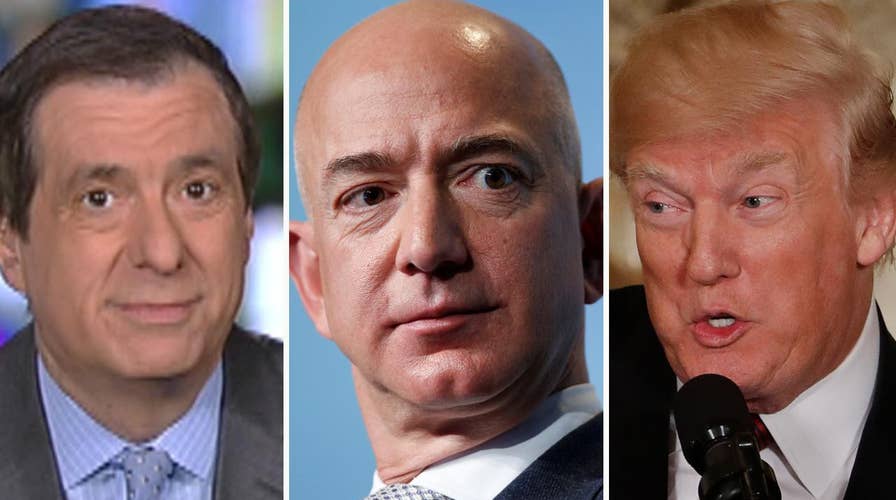Kurtz: Trump vs. Bezos is really about Washington Post
'MediaBuzz' host Howard Kurtz weighs in on Trump's escalating criticism of Amazon CEO Jeff Bezos.
Donald Trump isn't the first president to take on a business or industry he doesn't like.
As the New York Times reminds us, Barack Obama once went after Staples for not providing adequate health care for its workers and slammed Wall Street banks over bonuses.
Bill Clinton's administration pushed an antitrust suit to break up Microsoft.
Jack Kennedy assailed steel executives for raising prices by saying "my father always told me that all businessmen were sons of bitches."
And FDR railed against "malefactors of great wealth."
But Trump's attacks on Amazon are being treated very differently—and most of his predecessors didn’t name the offending CEOs.
At this point, of course, it's just words. The president hasn't actually proposed to change any policy that affects Amazon. But he's repeatedly complained about Amazon unfairly benefitting from low Postal Service rates, and that initially knocked $60 billion off the value of the company’s stock. (Many companies have continued to lose value as the markets slide with China retaliating for Trump's tariffs.)
What makes this different is that Trump's case against Amazon is so personal—and linked to, as he has told me and others, Jeff Bezos’ separate ownership of the Washington Post, a newspaper that the president is convinced has treated him unfairly. (The Post insists that Bezos has nothing to do with its news coverage.)
Amazon, for its part, has said nothing, has issued no statement challenging the president on the facts. It's a secretive company that rarely responds to journalists, and this in my view is a failure of corporate communications, even if it wants the story to die down.
The Times piece makes a larger argument about the president’s approach to corporate America: "Lately, Mr. Trump's antibusiness rants have become particularly menacing and caused the stocks of some companies to plunge."
The story notes that over the years he has attacked companies as varied as Verizon, Coke, Nordstrom, Sony and H&R Block, as well as media giants.
He has criticized the proposed merger between Time Warner (which includes CNN) and AT&T, which is under antitrust review by his administration.
The president has also gotten results. Even before taking office, he threatened to cancel Boeing's deal to build the next generation of Air Force One planes—though in the end he knocked down the price from $4 billion to $3.9 billion.
Clearly, having a career businessman as president brings both strengths and weaknesses. He's accustomed to using hardball negotiations, pointed threats and lawsuits to get his way.
But a president, unlike a real estate developer, can decimate a company's stock with a few words.
There's nothing wrong with Trump trying to get a better deal for the beleaguered Postal Service (though he names most of the board members that run the service). Yet that would affect every package shipper, not just Amazon—which, by the way, is incredibly popular with consumers even as the site (and many others) have hurt brick-and-mortar stores.
It's the perception that this is a personal feud—tied to the president's resentment of Bezos and the Post—that undercuts his case.






















